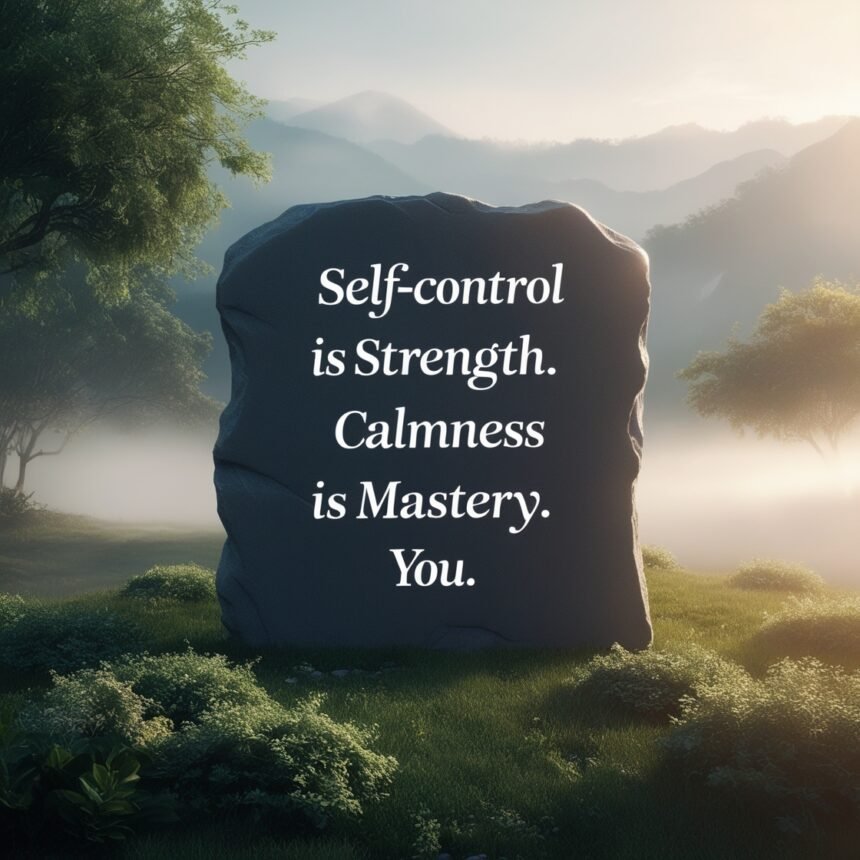In today’s fast-paced world, where challenges are inevitable, emotional stability becomes the true measure of strength. Self-control is strength. Calmness is mastery. You – Tymoff, speaks volumes about the importance of mastering these qualities to navigate through life’s adversities with grace and confidence. The ability to control your emotions and remain calm in stressful situations is not only a sign of mental toughness but also a crucial skill for success.
This article delves into the meaning behind the powerful quote from Tymoff, exploring how self-control and calmness are key elements of personal mastery. By the end of this post, you’ll gain practical insights into developing these traits and understanding how they can transform your life.
The Power of Self-Control
Self-control is more than just resisting temptations; it’s about mastering your thoughts, feelings, and actions. When faced with difficult situations, emotions can easily take over. Anger, frustration, or impatience can cloud our judgment and lead to poor decisions. But when you exercise self-control, you can manage these emotions and make more rational choices.
When Tymoff says, self-control is strength, it highlights that true strength lies in the ability to regulate emotions and impulses. This doesn’t mean suppressing your feelings but rather responding to them thoughtfully. For instance, in moments of anger, instead of reacting immediately, a person with self-control will pause, assess the situation, and respond in a way that aligns with their long-term goals.
Benefits of Self-Control
Self-control offers numerous benefits that extend beyond emotional well-being. First, it improves your relationships. People who exhibit self-control tend to communicate better, listen more, and act with greater empathy. Secondly, it contributes to achieving long-term goals. Whether you’re saving money, pursuing a career, or focusing on personal health, self-control helps you stay disciplined and focused on what matters most.
Another key aspect is mental resilience. People with strong self-control can bounce back from setbacks quicker because they don’t allow temporary emotions to derail their progress. This, in turn, enhances their ability to handle stress.
Calmness: The Key to Mastery
While self-control is the foundation of emotional strength, calmness is mastery. Tymoff implies that those who can remain calm in chaos possess a higher level of emotional intelligence. Calmness allows for clearer thinking, which is essential for problem-solving and making well-informed decisions.
In moments of crisis, a calm demeanor can be the difference between success and failure. Think about leaders or individuals you admire. The ones who can stay composed under pressure inspire confidence and trust. Calmness not only benefits the individual but also creates a ripple effect, influencing those around them.
Developing Calmness in Everyday Life
Like self-control, calmness is a skill that can be developed. One of the most effective ways to cultivate calmness is through mindfulness and breathing exercises. When we encounter stressful situations, our bodies naturally react with a fight-or-flight response. However, by practicing deep breathing and mindfulness, we can learn to manage this response and maintain a sense of calm.
Another important tip is to focus on the present. Often, we feel stressed or anxious about situations that haven’t happened yet. By staying present, we reduce unnecessary worry and maintain control over our emotions. Additionally, taking time to reflect and analyze before reacting can help you maintain a calm disposition.
How Self-Control and Calmness Work Together
While both self-control and calmness are powerful on their own, combining these traits creates a synergy that leads to mastery over one’s emotions. Self-control is strength Calmness is mastery You – Tymoff represents this harmonious relationship. When you can regulate your impulses and remain calm under pressure, you unlock a higher level of emotional intelligence.
For example, consider a challenging conversation at work. Without self-control, you might lose your temper and say something you regret. But with self-control, you can pause, listen carefully, and respond thoughtfully. If you add calmness to this equation, you’ll approach the conversation with a clearer mind, making it easier to find solutions and communicate effectively.
Practical Tips for Building Self-Control and Calmness
Building self-control and calmness requires practice, but it’s achievable with consistent effort. Here are some practical steps to help you develop these traits:
1. Set Clear Goals
Knowing what you want to achieve in both the short-term and long-term gives you direction. When you have clear goals, it’s easier to control impulses and stay focused. For instance, if your goal is to improve your health, you’ll be more likely to exercise self-control when faced with unhealthy food choices.
2. Practice Mindfulness
Mindfulness is the practice of staying present and fully engaged in the current moment. By regularly practicing mindfulness, you become more aware of your thoughts and emotions, which enhances your self-control. It also allows you to remain calm, even in high-stress situations.
3. Create Positive Habits
Establishing positive habits can reinforce your self-control. Start by building small, achievable routines such as daily meditation, exercise, or reading. These habits strengthen your discipline, making it easier to stay calm and in control when bigger challenges arise.
4. Learn to Pause Before Reacting
One of the simplest but most effective ways to practice self-control and calmness is to pause before reacting. In moments of stress or frustration, take a deep breath, count to five, and then decide how to respond. This brief pause can make a world of difference in your emotional responses.
5. Reflect Regularly
Take time to reflect on your actions and responses. Regular reflection helps you identify patterns in your behavior and areas for improvement. By acknowledging your emotional triggers, you can work on controlling them better in the future.
Read more: Drew Brees Makes His NBC Debut: A New Era in Broadcasting Begins
FAQ: Self-Control Is Strength Calmness Is Mastery You – Tymoff
When Tymoff says self-control is strength, it means that real strength comes from the ability to control your emotions and impulses. Instead of reacting based on immediate feelings, individuals with self-control think through their actions, making decisions that align with their long-term goals.
Developing calmness involves practicing mindfulness, deep breathing, and focusing on the present moment. By training your mind to stay calm in stressful situations, you enhance your ability to think clearly and make better decisions.
Calmness is considered mastery because it allows you to maintain control over your emotions in the most challenging circumstances. People who remain calm are better equipped to handle stress, solve problems, and lead effectively.
Self-control and calmness work hand-in-hand. Self-control helps you manage your impulses, while calmness allows you to approach situations with a clear and focused mind. Together, these traits enable emotional mastery, leading to better decision-making and personal growth.
You can strengthen your self-control by setting clear goals, practicing mindfulness, developing positive habits, and reflecting on your actions. Consistent practice in these areas will help you build emotional resilience and control.
Conclusion
In conclusion, self-control is strength Calmness is mastery You – Tymoff highlights the power of emotional regulation and mental clarity in personal and professional growth. By developing self-control and calmness, you can not only navigate through life’s challenges more effectively but also build stronger relationships, achieve long-term goals, and cultivate inner peace.
Mastering these traits requires practice, but with dedication and mindfulness, anyone can learn to harness their emotions and remain calm under pressure. Take small steps every day to improve your emotional intelligence, and you’ll see the profound impact these qualities can have on your overall well-being.





